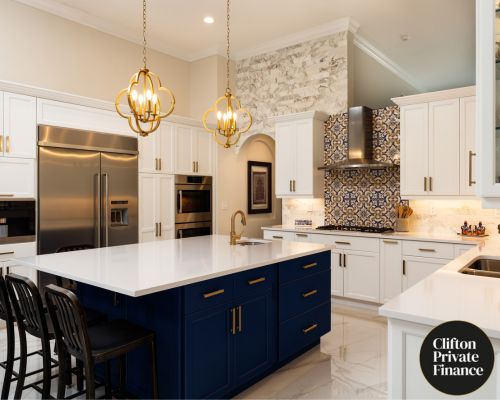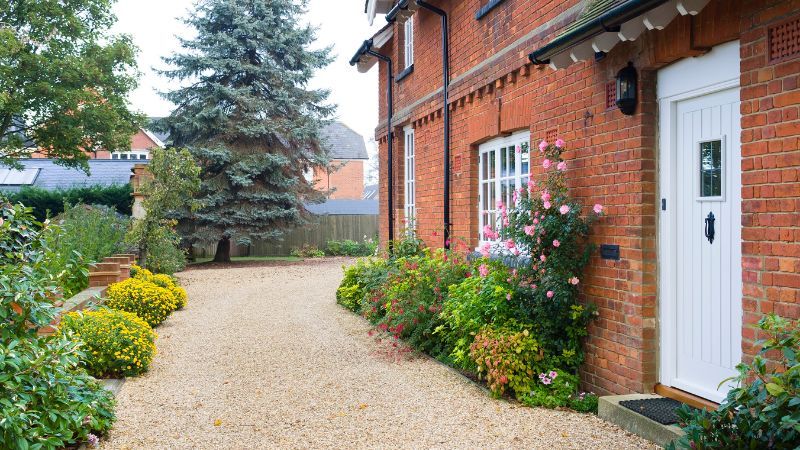Categories
Secured loan for home improvements using equity in your house

Homeowners can access funding to pay for value-adding home improvements and renovations (or a variety of other purposes) by using the value locked away in their home as security.
This can be a flexible and quickly-arranged source of funding for those who can manage the additional borrowing costs. It's not entirely risk-free, so why might you find it useful?
What is a secured loan?
This kind of borrowing is a type of mortgage, which is why it’s also known as a second charge mortgage, or a “homeowner loan”.
It’s a second charge because it sits behind the primary mortgage on your home, taking second priority in the event that you have to sell your home to repay the borrowing.
For that reason the interest rates are generally higher on second-charge borrowing, reflecting the fact that the first-charge lender will be first in the queue for repayment.
The pros and cons
A secured loan is fast, very flexible finance, and can be used for purposes beyond property-related spending: lenders may approve loans for business purposes, to consolidate debt, car purchase, or even gifting to a family member.
For larger loan sums (for example, above £50,000) a lender may ask for evidence of the purpose of the loan.
It’s important for borrowers to bear in mind that the "security" is for the lender, not the borrower. The loan is secured against the title deeds of the borrower’s home – which is why the first-charge mortgage holder must agree to a second charge being raised against the property. And in a worst-case scenario borrowers stand to lose their property if they can’t keep up loan repayments.
Funds for property improvements
With Brexit taking its toll on the residential property market, only the most determined property traders are making a move just now.
So it makes sense for homeowners who have built up a nest-egg of equity in their homes to think of making home improvements rather than moving house. They get more of the home they’ve wanted, without the expense and risk of relocating. And they add value to their home against the day that they do decide to put it on the market.

Funds for a property investment
You may be considering investing in a buy to let property to spread your income base and provide a bit more stability.
Second charge mortgages may not be the fastest way to raise finance for an investment, but they can provide a significant amount of capital and enable you to benefit from a commercial opportunity that comes your way.
A new flexibility
We are finding lenders offering greater flexibility on their lending criteria, reflecting modern earning (and borrowing) patterns. Amongst other things, they will consider
- Applicants earning over £12,500 in their main job
- Borrowers who will be up to the age of 85 at the end of the loan period
- Self-employed and contractors who may only be on six-month contracts
- Applicants whose take-home pay is heavily dependent on bonuses or commission: 100% of these earnings may be considered if they are guaranteed or can be shown for three years, 50% if they are regular
- 100% of shift-work earnings if they are guaranteed
Getting a secure home loan: the questions to consider
- Is a second charge mortgage your most appropriate borrowing? If you want to raise less than £25K you may find cheaper borrowing options as an unsecured loan. If you want to raise a significant sum of money but can repay within 12 months, a bridging loan might be what you need.
- Will your primary mortgage lender accept a second charge on the property? You will need to contact them and ask.
- How much can you borrow? You will need to know the remaining balance on your mortgage – this will give you the Loan to Value (LTV) you can achieve. The maximum LTV most lenders will consider for a second charge mortgage is 75% (ie borrower has built up 25% equity in the property), but it is possible to secure 85% or more, depending on your circumstances.
- How does your credit rating affect the cost of a secured loan? Your credit rating will be a significant factor in the availability and cost of a secured loan to you. Check your credit rating online with one of the three UK credit ratings agencies: Experian, Equifax and TransUnion (formerly CallCredit). (You don’t need to sign up for their premium monthly service.) Factors that can contribute to an adverse credit rating include:
- late payment of a utility bill
- entering into an Individual Voluntary Arrangement (IVA) with your creditors
- bankruptcy proceedings
- a County Court Judgment (CCJ)
- Will a secured loan be affordable for you? This is a significant financial commitment: it’s advisable to break down your monthly incomings and outgoings to ascertain just how much you can afford to repay each month.
Some lenders will offer longer terms of finance in exchange for smaller monthly payments, and will even allow your second charge mortgage to extend beyond the term of your first-charge, effectively becoming your first charge mortgage when that has been paid off.
You need to strike a balance between affordability and longevity: if you agree to a term for a second charge that is longer than you need, it may end up costing you a significant amount more than is necessary.
But if you’re paying double-figure interest on monthly credit card balances, you may well save money by consolidating your debts into one loan, even at secured-loan rates.
- What if you can’t make a payment? Some second-charge lenders provide a "payment holiday" option to defer mortgage repayments for an agreed period of time. If you have an uneven pattern of earnings, or you know from your past payment record that this may be the flexibility you need, consider looking for a second charge mortgage that allows this flexibility.
The application process
In April 2016, the Financial Conduct Authority became the governing body for second charge mortgages and the application process for these loans changed to mirror the application process of a first charge residential mortgage.
1 Fact finding…
When you speak to a mortgage adviser you will need to provide them with as much information possible about what you need, and your income, your property and your employment.
Your adviser will identify a couple of second charge mortgage options which suit your circumstances.
If you’re satisfied that one of the options provided is the right one for you, the adviser will submit your details to a lender to find out if they’re prepared to lend to you.
If the lender is prepared to potentially grant you a second charge mortgage, they will send back a Decision in Principle.

2 The application process…
Upon receipt of the Second Charge Decision in Principle, a full affordability check will be carried out, with an in-depth review of:
- Your income
- Your monthly expenditure
- Your most recent credit rating
- Your references
3 Documentation needed for your affordability check…
For applicants who are employed your adviser will need:
- proof of identity
- most recent payslips (eg last three if paid monthly, last four if paid weekly or fortnightly)
- bank statement or P60
For applicants who are self employed or contractors, the proofs of income may include signed accounts, HMRC tax calculations and signed contracts.
When your adviser has this documentation and information they can underwrite your application and send it to the lender.
4 Property surveyor's valuation…
If the lender is satisfied with your affordability check they will request a valuation of your property, to be carried out by a professional property surveyor.
5 Second charge mortgage offer and the European Standardised Information Sheet…
If your application is successful, the lender will send a full breakdown of the features of their mortgage offer, together with a European Standardised Information Sheet (ESIS).
The ESIS will give you a summary of the main features of your second charge mortgage application, the full terms of the offer, and cooling-off period to consider the terms.
Typically, you will have seven days to decide whether you want to accept the lender's offer. The offer cannot be changed or withdrawn during this grace period, unless any of the information provided in your application is false.
You can use this time to compare the details of this loan offer to other loans on the market. Or you can accept the offer straight away.
Using Clifton Private Finance to arrange a secured homeowner loan
It is possible to arrange a second charge mortgage without the help of a mortgage adviser, but you may find it very helpful, and also cost-effective, to discuss your finance needs with an experienced professional who can lay out all the options for you, and find the most appropriate borrowing for you.
The best product isn’t necessarily the one you thought you were looking for.
We have strong professional relationships with high street banks, specialist lenders, and can secure market leading terms to meet our clients' needs.
Depending on your personal circumstances, we can access second charge mortgages up to 85% LTV, and sometimes higher.
The application process can be quick: depending on your circumstances, the readiness of your documentation and how quickly a valuation can be arranged, funding can be available in 3 weeks.
Contact us to discuss what you need:
















